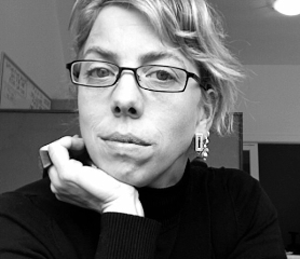
For Amanda Euringer growing up in Nanaimo, the rotten egg stink of pulp mill emissions was just a regular part of life. "As a kid you were kind of thinking, 'This can't be right. But, well it's just the mill,'" she recalls. Now she can't help wondering if there is any connection to the fact that Nanaimo's population has unusually high rates of thyroid-related diseases.
Euringer, whose series "Toxics: Your Right to Know" starts today on the Tyee, lives on Bowen Island with Rael, her nine-year-old daughter. When Rael gets a whiff of bleach or some other acrid chemical, she's quick to say "That's disgusting!" and to be suspicious of a possible threat to her health. Amanda encourages that response. Sometimes it sets her in motion. Recently, at Rael's urging, Amanda joined a protest by children and parents against installing an artificial turf playing field near their home. (Grassroots activism, indeed!)
Empowering laws exist
In her daughter, Euringer sees a new generation of know-your-rights activists blooming. She wanted to do her part by not only reporting on toxic dangers in our daily environments, but by highlighting everyday heroes who have used existing laws to fight for cleaner, safer conditions.
That's the subject of Euringer's series, the result of months of investigation funded by members of the Tyee community who gave to our Solutions Reporting Fellowship Fund. Without the $5,000 grant Euringer received, she says, "I would never have been able to take the time off to afford to do this. Real journalism cannot happen without proper pay. Even though there is all this free stuff on the Net, personally, as a single mother I'm not going to put my reporting on the Net for free."
Along the way, Euringer found herself changing her views on how social change happens, and the role unions play. As she researched examples of workers standing up to bosses to get unhealthy conditions fixed, she saw time and again that labour unions not only provided political and legal support, they helped educate workers about their rights. "I went from someone who didn't admire unions to really admiring the power that unions have."
As anti-toxics activist Mae Burrows explained to her, laws already are on the books to empower workers to demand a healthy workplace.
"I talk to a lot of people who worry their workplace isn't safe, but they think they can't do anything about it. 'We'll get fired,' they say. But they don't realize how much power they have. If people knew, they would get excited and do something about it."
When that happens, many others often benefit as a result, she notes. "For example, I didn't know we use [less toxic] type-one diesel in our busses. And the bus mechanics were the ones who were at the start of changing that. They stood up for their right to work with safer chemicals that were available."
More questions ahead
Euringer says reporting this series has caused her to make many changes in her own life. "It's pretty impossible to write a series about how the world is being poisoned and drive your car as much. I changed pretty much everything I use in my house. I use the greenest products possible."
But she says learning the facts about chemical risks, and your right to act on that knowledge, is an ongoing journey.
"Even though in my series I'm asking more questions than I'm answering, that's partly because I had the time to look into the issue and see there were all those question to raise. It's pretty complicated, but I know that we have the power to act on what we do know, and to keep demanding new answers."
As she takes that journey, she's pleased to have a natural ally in Rael.
"Our public school system is instilling in kids a strong civic value as far as environment goes. They definitely feel entitled to their opinion. That doesn't make for easy parenting," says Euringer. "But you might get a kid who tells you that you need to hold up a sign and protest the plastic soccer field!"
Related Tyee stories:
- About the Tyee Reporting Fellowships Program
- How to apply for a Tyee Fellowship
- How to give to the Tyee Investigative and Solutions Reporting Fellowship Funds
Read more: Rights + Justice, Labour + Industry, Environment
















Tyee Commenting Guidelines
Comments that violate guidelines risk being deleted, and violations may result in a temporary or permanent user ban. Maintain the spirit of good conversation to stay in the discussion.
*Please note The Tyee is not a forum for spreading misinformation about COVID-19, denying its existence or minimizing its risk to public health.
Do:
Do not: